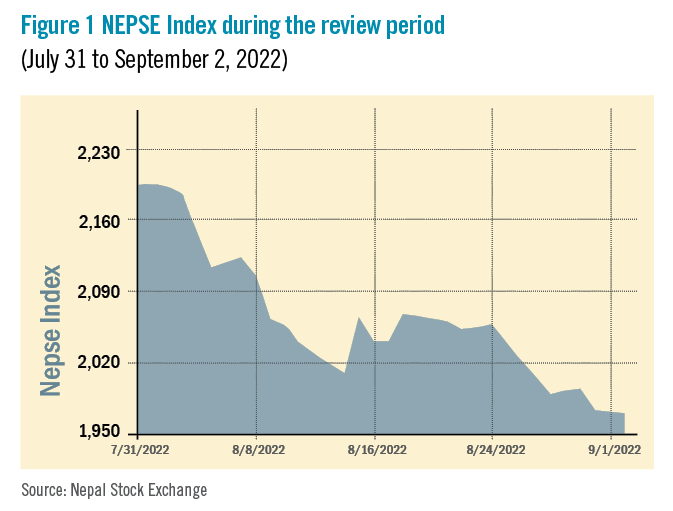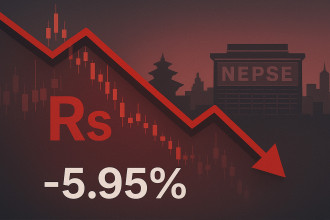
During the review period from July 31 to September 2, the Nepal Stock Exchange (NEPSE) index decreased by 169.90 points (-7.94%) to close below the psychological support of 2,000 mark at 1,970.62 points. Although the market began the review period as high as 2,195.10 points on July 31, the index gradually declined thereafter. High selling pressure in the market to book profits along with low investor confidence were two of the critical factors behind this. As a result, the overall market volume during the review period decreased by 1.46% with a total transaction of Rs 62.745 billion. During the review period, contrary to the previous review period, all of the sub-indices landed in the red zone, showing signs of selling pressure at the market. Finance sub-index (-16.16%) was the biggest loser as the share value of Gurkhas Finance (-Rs 168.7), Manjushree Finance (-Rs 112.2) and Pokhara Finance (-Rs 94) decreased substantially. Development bank sub-index (-13.81%) was second in line with decline in the share prices of Excel Development (-Rs 96), Kamana Sewa Development (-Rs 72) and Mahalaxmi Development (-Rs 69). Hydropower sub-index (-11.01%) followed suit with fall in the share prices of Radhi Bidhyut Hydropower (-Rs 334), Upper Tamakoshi Hydropower (-Rs 113) and Synergy Power Development (-Rs 70.1). Hotels and tourism sub-index (-10.75%) also declined as share value of Taragaon Regency (-Rs 44), Soaltee Hotel (-Rs 22.4) and Oriental Hotels (-Rs 16) went down. Similarly, Microfinance sub-index (-9.86%) went down as share prices of National Microfinance (-Rs 275), Laxmi Microfinance (-Rs 262.9) and Mithila Microfinance (-Rs 236) decreased. Others sub-index (-9.08%) also substantially decreased with a drop in the share value of Citizen Investment Trust (-Rs 901.5), Hydroelectricity Investment & Development (-Rs 104.8) and Nepal Telecom (-Rs 47). Manufacturing and Processing sub-index (-8.82%) witnessed a plunge in the share prices of Bottlers Nepal (-Rs 830.3) and Shivam Cements (-Rs 133.8). Likewise, Life Insurance sub-index (-6.854%) faced a slump with the fall in share value of Nepal Life Insurance (-Rs 103), Asian Life Insurance (-Rs 61) and National Life Insurance (-Rs 55). Commercial Bank sub-index (-4.69%) also followed suit with decline in the share value of Nabil Bank (-Rs 85), NIC Asia (-Rs 62.9) and Standard Chartered Bank (-Rs 46). Lastly, Non-life Insurance sub-index (-4.25%) also lost value with a marginal decline in share prices of Rastriya Beema Company (-Rs 455), Shikhar Insurance (-Rs 97) and NLG Insurance (-Rs 55.6). 
News and Highlights
During the review period, Securities Exchange Board of Nepal (SEBON) permitted Global Equity Fund (GEF) to operate venture capital business after the firm fulfilled all the criteria set by law. With this, eight other applicants namely: Adhyanta Fund Limited, Avasar Fund Limited, NMB Capital, NIC Asia Capital, Prabhu Capital, Laxmi Capital Market, Nabil Investment Banking and NIBL Capital who had applied along with GEF are in the process of fulfilling mandatory provisions. Experts of the secondary market believe that such licences are being granted to private equity funds to asssist startups and expand SMEs that would otherwise find it difficult to obtain finance from banks and other financial institutions. The secondary market is, thus, taking SEBON’s approval of allowing private equity firms to manage specialised funds as a positive step, but some investors are still apprehensive about the procedure and the time it will take to grant the licence. On the public issue front, SEBON approved the IPOs of Shrijanshil Microfinance worth Rs 109.37 million with Sunrise Capital as the issue manager. Similarly, SEBON has also approved the right shares of Narayani Development Bank worth Rs 262.4 million with Global IME Capital as its issue manager.
Outlook
The confidence of investors has continued to decline as a result of the growing selling pressure that has been building since the start of the new fiscal year 2022/23. Additionally, it appears that the bulk of investors have adopted a wait-and-watch approach because listed companies will gradually announce returns from the previous fiscal year earnings. On a positive note, SEBON has started to provide licence to operate Private Equity Fund under the Specialised Investment Fund Regulation. These funds have the potential to work well for the market. Nevertheless, speculations on the time and process of making the approval for the funds remains a major concern. More of such enabling policies if implemented effectively can improve market optimism in the coming months. This is an analysis from beed Management. No expressed or implied warrant is made for usefulness or completeness of this information and no liability will be accepted for consequences of actions taken on the basis of this analysis.
READ ALSO:






